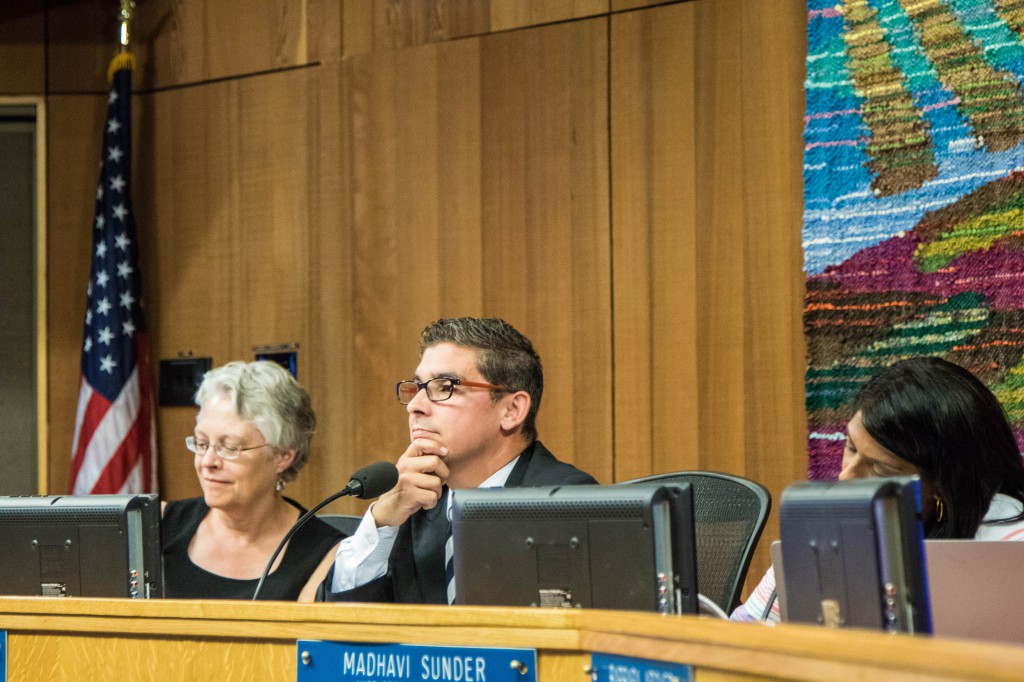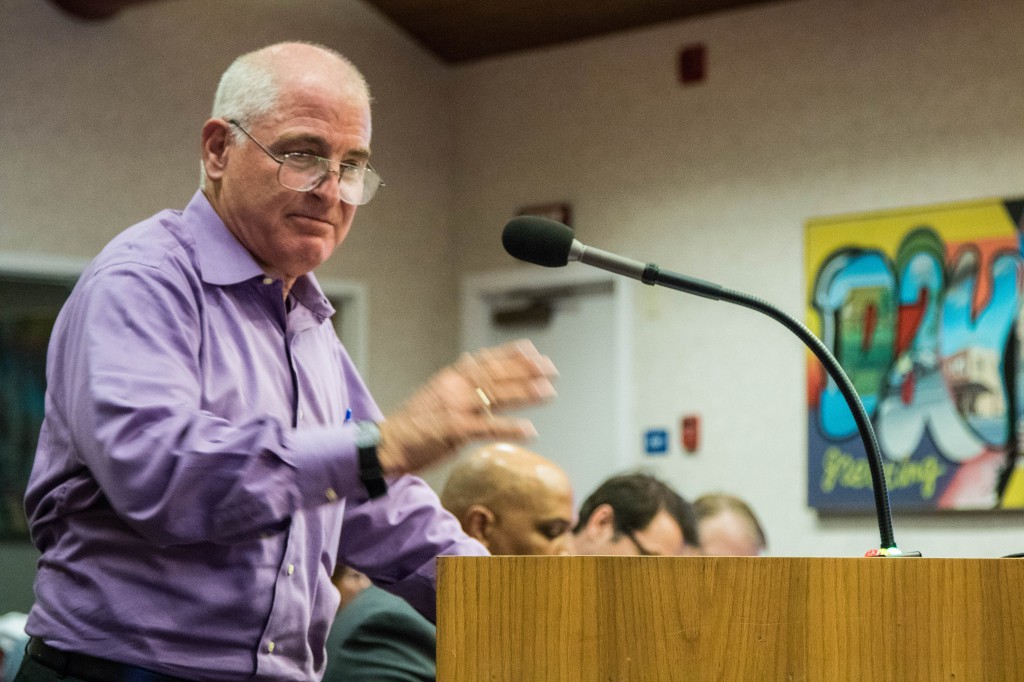

On Friday, we had two reports on Thursday’s DJUSD School Board meeting. We presented the comments by the Davis School Board (Both Sides of AIM/GATE Debate Turn Out for Special July Meeting) and the first portion of public comments (Both Sides of AIM/GATE Debate Turn Out for Special July Meeting – Public Comment).
The public came out and expressed thanks and criticism to the board, sometimes in the same comment. There were concerns expressed about the program – on one side, about the treatment of kids who were not in the program, criticisms of segregation and bullying and the strengths of differentiated education. On the other side were concerns about process, the laying off of Deanne Quinn and the needs of gifted but under-achieving children.
Forty-five people in all spoke – many passionately and many making strong and eloquent points on both sides of what might be described as the divide. There was a slight advantage in the audience and among the speakers – to the pro-AIM side of the issue – but it was slight.
By our count, 24 of the 45 speakers were in favor of AIM/GATE. Almost the entire left side of the chamber seemed filled with GATE supporters while 75 to 80 percent of the right side (which was maybe at 60 percent capacity) was pro-change.
Eric Hayes took issue with the statistical report that was presented last month, “to be brief the most important to say about that report is that it does not say there is no correlation between being in or out of the AIM program and improvements in state-mandated assessment scores.”
Instead, he said, “What the report said was that the results of their regression were statistically insignificant – which could mean there is no relation between AIM classrooms and STAR results or it could mean that the statistics that they used didn’t work perhaps because of the sample size or because they were using the wrong statistical tool.”
He noted, “I think a good argument could be made that a regression discontinuity model is not a good tool.” He argued, “In absence of something definitive from the Correll effort, I think we fall back on earlier research… that was presented to the board two years ago.”

This research found that self-contained GATE classes improved STAR test results for all kids in the district, both in GATE and traditional classrooms.
Brian Ehlers spoke and said, “I want to support the notion that differentiation should receive the utmost priority and support for teachers.” He said, “I don’t think anyone disputes the notion of equity, it’s just determining what true equity is in this process.”
Nadine Hilden, a neighborhood teacher at Birch Lane spoke, “I want to assure the board and the public that neighborhood teachers focus on meeting the needs of all of our students. In our district, teachers believe in inclusion – why not support AIM students through enrichment opportunities that are available in the neighborhood classrooms and allow our community to be whole.”
She said that the district offers many professional development opportunities in differentiation, including a year-long training.
Jeff Dale spoke about process: “We have processes in governance to ensure transparency, accountability and stakeholder participation.” He argued that we have processes in place to ensure that “issues are openly discussed and carefully resolved before making any drastic changes or attempting to implement something new.”
He said that the school board owes the public an explanation “as to why these procedures are not being followed in this case.” The Superintendent and top administrators will be drafting a plan on their own, “without the effective mechanisms used to get input” from parent, teachers and other experts.
Cathy Bryant, who teaches at Holmes Junior High, said “people are saying things that are simply not on target.” She said, “Deanne Quinn provided amazing resources to the teachers that were starting out.” She expressed concern about the non-renewal of Quinn’s VSA (variable service agreement).
“My concern is that dismantling a program that is highly successful – people are beating the door to get into the program – when we’re working really hard to break it apart,” she explained. “We’re not really addressing the needs of the bottom quartile.”
She went on to say, “(Deanne Quinn) is the queen of collaboration and I really think there’s a fear surrounding Deanne Quinn because she has the power to pull people together… In terms of the district saying it’s a personnel issue – I have a problem with that.”
Ms. Bryant said, “Employees of this district are muzzled – we cannot talk, we are attacked and people are saying it’s a personnel issue and we can’t tell you what’s going on. I don’t believe that.” She added, “I think Deanne Quinn is a scapegoat for other needs in this district and we need to step up and say… we need to serve all kids. If we want the bottom quartile to be better, why aren’t we serving those needs.”
Jean Weave quoted Benjamin Disraeli regarding “lies, damn lies, and statistics.” “Let’s not reduce students down to statistics,” she said. “Taking aim at the GATE students and teachers does nothing to support our underperforming lower quartile.”
She said that “while differentiation might have worked in 19th Century rural America but it is certainly not the wave of the future.” Ms. Weave said that moving GATE students back to the classroom might take the focus off the achievement gap, “but those underperforming students are still there.”
Evelyn Falkenstein questioned their research, asking whether the district has assessed how AIM students and their parents feel AIM has helped them. “Or have you just been hearing from the few of us who have been coming to your summer meetings?” she asked, noting that almost no students drop out of the AIM program. She said, “Obviously almost none of those students have been admitted without cause.”
Adam Hutchinson, who is 10 years old and an AIM student at Willet, said, “I really think you should keep it. When I was in a regular class I was bored and unhappy.” He said when he was done with arithmetic, “they would just give me more sheets and I didn’t like it because I was working at too fast a pace.”

He said he didn’t like to go to school “and I even asked my parents if they would home school me.” He likes AIM a lot better, as “there are kids like me and this allows my academic skill to flourish because I don’t have to work at too slow a pace.”
Katherine Unger said, “Tonight I have a question for the board, what’s the rush?” She noted the board’s June 4 decision which affects more than 2000 students. She continued, “The district has pledged differentiation in all classrooms for at least the last twenty years.”
“Why would a board, four whose members are brand new and none of whom gave any indication of their intention prior to their election last fall seek to dismantle a successful program without involving the public and specifically the stakeholder of AIM teachers and families?”
Ms. Unger added, “I’m not opposed to change but I am opposed to the process that occurred that night.” She continued, “When asked about a potential Brown Act violation, the public was told that no real change had been made in the program and that public discussion would take place at the very next meeting before any change was implemented, but at the very next meeting the same board voted not to renew the contract of the AIM coordinator.
“There was no reason given as to this action except for one comment that decisions such as these should be made by a permanent rather than a temporary employee. This AIM coordinator has served in her position for nearly 23 years – hardly a temporary employee.”
Frank Fox, a retired educator, said, “I’m not here to talk about the politics of what’s going on, I’m here to talk about the reality of kids. Every single kid deserves an education to the best of their ability. We live in 2015, why aren’t we now working on an individual plan for each and every kid that’s in the district?”
He said, “We take blankets like AIM… and throw it over kids. That’s not fair and that really is not necessary.” He argued that we can really find out what every kids really needs and we can really meet the need.
“We need to put politics aside and all of the machinations of firing teachers, it’s madness,” he stated. “If we say this kid is more special than this other kid that is really discriminatory.” He spent 42 years as a teacher and professor, “and I still feel as passionately about that as I did 42 years ago.” He added, “Everybody’s special.”

Alan Hirsch noted that there is a lot of concern about parents “getting a rigorous education for their kids.” He noted his daughter was bored in her classes. He put her in the GATE classes “and she was bored. She’s now at Da Vinci, she’s still bored.”
He noted that we have a tracking program for high-achieving students but “the science says that tracking doesn’t work. I think the top schools are moving away from that.”
Mr. Hirsch argued that “we don’t have a GATE program anymore. Most of the kids in the program don’t have those needs. We have a tracking program – kids that qualify for the program and don’t get in, they get lost. We don’t emphasize differentiation – and that’s not fair and that’s not right.”
Jill Van Zanten said, “I think what the board has decided to do is quite simple and justified.” She said, “That is look at what the AIM program is supposed to be and do by definition and compare that to actual practice of how kids are selected to this program and get the definition and the practice better aligned.”
She called the end of private testing “a modest first step.” The second step is to “reevaluate the retesting instruments being used by the district to make sure that whatever instruments we use actually help identify kids who need to be in the gifted classroom.”
The third step, the biggest, is to expand “best practices of differentiated instruction in every classroom in the district so that every child receives the engaging and rigorous instruction that they deserve.”
The Vanguard will have the final segment of public comment in a future installment.
—David M. Greenwald reporting
